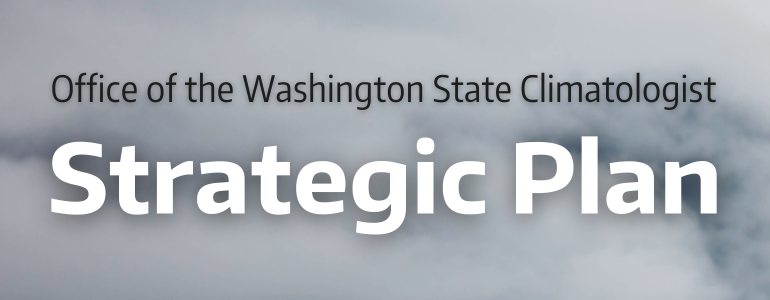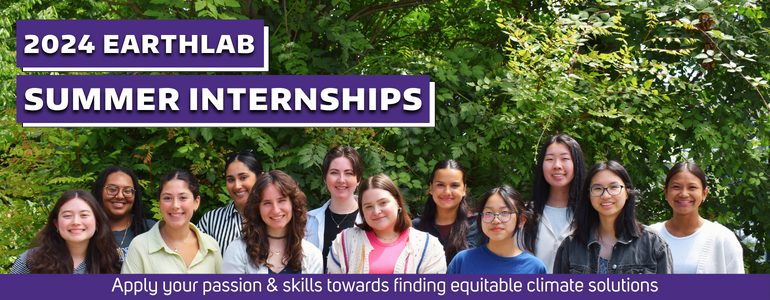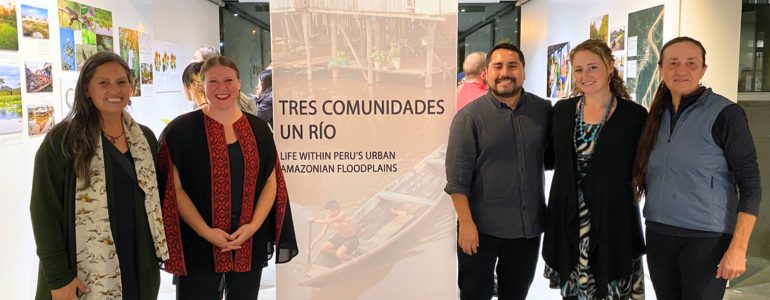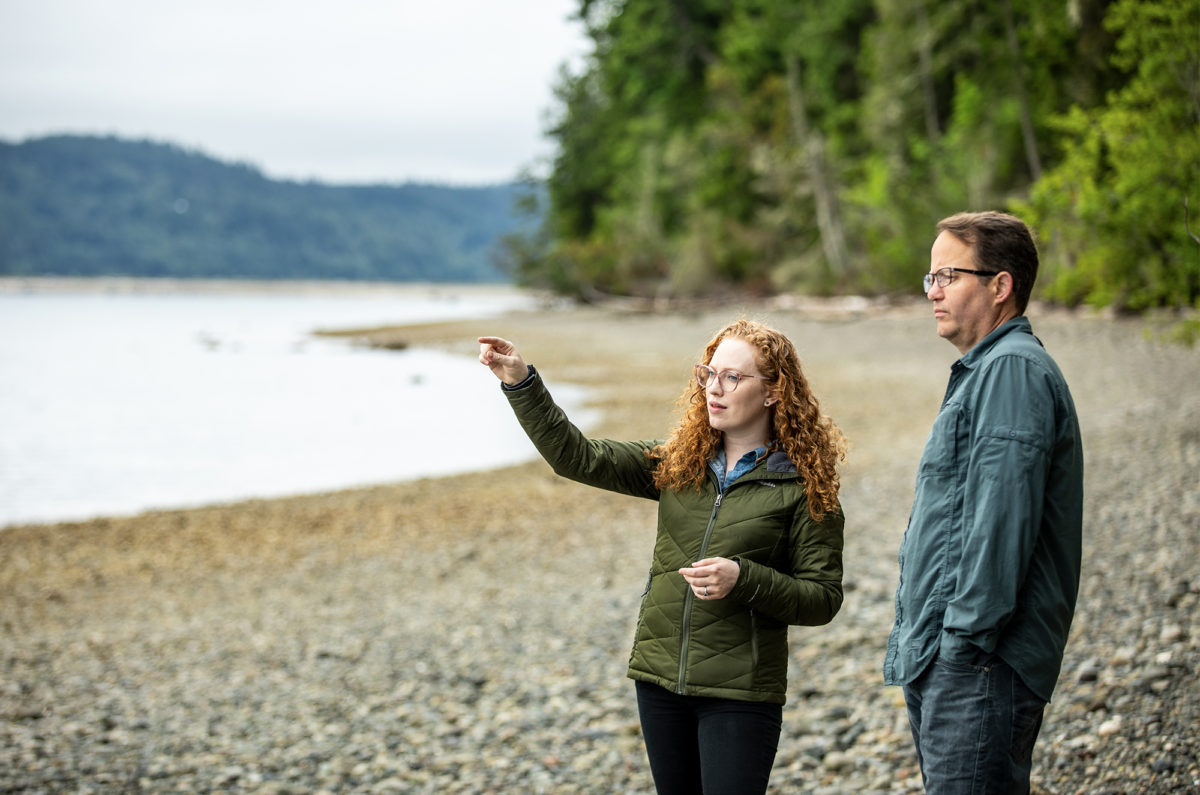EarthLab News
Now Hiring: Washington State Climatologist
The Office of the Washington State Climatologist and the Climate Impacts Group are hiring a State Climatologist to lead the activities of the Office of the Washington State Climatologist. The Office of the Washington State Climatologist serves as a credible and expert source of climate and weather information for the state of Washington. They specialize in analyzing weather and climate trends within the broader context of climate change, and disseminating this information through presentations, media interviews, committee participation and more. The Office’s newly-released strategic plan outlines four strategic goals in support of their mission: 1) provide reputable climate data and interpretation, 2) broaden climate services through targeted engagement, 3) coproduce new applied climate research, and 4) acquire resources for the sustainability of the Office.
Read moreOffice of the Washington State Climatologist Releases New Strategic Plan
The Office of the Washington State Climatologist has released a new strategic plan to guide their future work. Among several key priorities, the strategic plan emphasizes engaging with decision makers and communities and co-producing applied research. In summer 2023, the Office of the Washington State Climatologist joined the Climate Impacts Group and became a member organization of EarthLab; the strategic plan further aligns the goals of the Climatologist’s Office and their new host organizations.
Read moreApply today to the EarthLab Summer Internship Program
Ready for a summer that’s more than just a break? Immerse yourself in the EarthLab Summer Internship Program! This isn’t your typical summer gig—it’s a paid stipend opportunity for any current UW undergrad from any discipline or campus that is currently enrolled as of Spring 2024.
This year, we’re offering 16 placements with EarthLab member organizations and our colleagues at The Nature Conservancy and Puget Sound Institute for a dynamic 9-week experience.
Exhibit at UW Explores the Intersection of Art, Health and Environment in the Peruvian Amazon
Since time immemorial, people in the Peruvian Amazon rainforest have been living on or near the river floodplains, creating symbiotic cultures echoing the rhythms of the rich biodiversity that are found in this rainforest. However, recent centuries have brought resource exploitation and colonization to this area, which has forced hundreds of thousands to migrate from the deep jungle to Iquitos—a jungle city of half a million people and the largest in the world accessible only by river.
Read moreSupporting Tribal-led salmon monitoring using computer vision
Climate change is not only negatively affecting Chinook salmon populations, but it’s also making it harder to monitor those affects. UW assistant professors Andrew Berdahl and Karen Leung are working on a solution, with an EarthLab Innovation Grant, that will not only make monitoring more easy and accurate, but will also give the Sauk-Suiattle Indian Tribe more power to manage their salmon stock.
Read moreNative American Heritage Month 2023: Resources and Activities
November is Native American Heritage Month -- a time to acknowledge and celebrate the history, resilience, and contributions of Indigenous peoples in our communities in the past, present and future. In Seattle (and on the UW campus), we're fortunate to have many nearby opportunities to listen, learn, donate, and act in solidarity to create a more just and equitable future. This list is by no means exhaustive, but it's a good place to start if you're looking to find ways to engage before November is over.
Read moreListen to the NCA5 Companion Podcasts
The Fifth National Climate Assessment (NCA5) Companion Podcast is a limited series intended to introduce the report, showcase the perspectives of NCA5 authors and staff, and demonstrate how the Assessment can help inform decisions. In this edition of the NCA5, several members of the Climate Impacts Group contributed. NCA5, which was released in fall 2023, is the US. Government’s preeminent report on climate change impacts, risks, and adaptation across the Nation. It is a congressionally mandated, interagency effort that brings together hundreds of experts from federal, state, and local governments, as well as the academic, non-profit, and private sectors.
Read more5th National Climate Assessment authors include UW climate experts
Three University of Washington EarthLab experts are among the authors of the newly released Fifth National Climate Assessment, an overview of climate trends, impacts and efforts to mitigate and adapt to climate change across the nation. The assessment is produced roughly every four years, led by the U.S. Global Change Research Program and mandated by Congress. The fifth edition, released Nov. 14, assesses current and future risks posed by climate change in 10 regions.
Read moreCIG and partners mark release of Fifth National Climate Assessment
Climate Impacts Group scientists were among hundreds of authors of the newly-released Fifth National Climate Assessment. The assessment, released roughly every four years by the The U.S. Global Change Research Program, assesses the effects of climate change on a wide range of sectors and for 10 geographic regions across the U.S.
The assessment captures a range of potential impacts and aims to help decision-makers better identify and understand climate risks that could be avoided or reduced. Over a three-year period, authors synthesize individual studies, data and models and apply best expert judgment to characterize certainty.
Dr. Crystal Raymond, climate adaptation specialist at the Climate Impacts Group, and Erica Asinas, formerly a research scientist at the Climate Impacts Group and now at Urban Oceans Lab, are authors on the Northwest Chapter.
Read moreApplication Now Open for Future Rivers 2024/25
Future Rivers is extending their grant and offering their program at least one more year! Any current or prospective Masters or PhD student with an interest in freshwater science from any department at the University of Washington can apply. Application review and decisions will happen in late winter (Feb/March) 2024; applications received by the January 26 deadline will be eligible for funding consideration.
Read more






